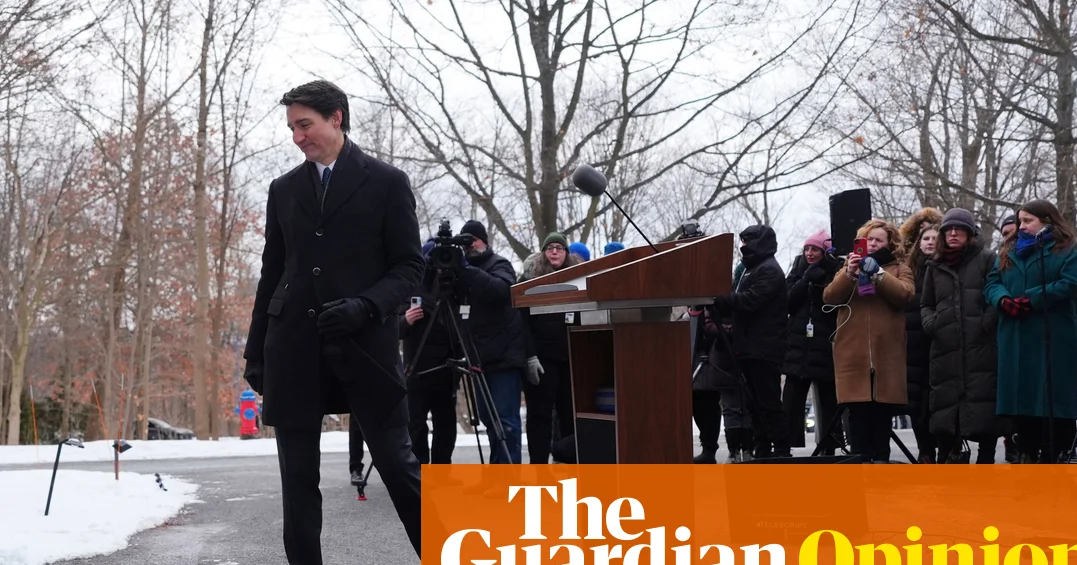Justin Trudeau has announced he will step down as Canadian prime minister after his successor is chosen, probably by the end of March. Trudeau says he is leaving because despite being “a fighter”, he cannot lead his party into the forthcoming election while facing internal party divisions. In sum, his caucus, his Liberal party and the country want him gone. So off he goes, perhaps better late than never. But despite his reasoning, his resignation remains difficult to understand.
Up until Christmas Trudeau had repeatedly said he was staying on, ready and eager to fight Pierre Poilievre and the Conservative party – who are up by more than 20 points in polls – in this year’s election. But calls for him to resign had been creeping into the public view, from former members of parliament, cabinet ministers and even current MPs.
So why was he forced out? What were the internal party divisions he cited as he stood in front of his home at Rideau Cottage in Ottawa on Monday and announced his departure?
When Chrystia Freeland, then finance minister and deputy prime minister, quit just before Christmas, on the day she was due to present the government’s economic update, pressure for Trudeau to step aside grew louder and more frequent. Freeland couldn’t abide Trudeau’s fiscal ways – too keen to spend in the face of a growing deficit and tariff threats from the incoming Trump administration; too gimmicky, with the government’s sales tax holiday plans (fulfilled) and intention to send working Canadians a $250 stimulus cheque (unfulfilled).
By the new year, the Liberal party’s regional Atlantic and Quebec caucuses had abandoned Trudeau, as the prime minister had lost the support of most of his supporters. The Liberals swept every seat in Atlantic Canada in 2015 on their way to a sizeable majority and they are unlikely to form a government without robust support in Quebec. The position had become utterly untenable for Trudeau.
Global News says every MP it spoke to said Trudeau had gone too far left. It’s a risible claim, but a grievance that had been circulating for some time among a cadre of more fiscally austere Liberals. In a way, that concern was echoed in Freeland’s resignation letter, where she wrote that in the face of Donald Trump’s threat of big tariffs, Canada must “keep our fiscal powder dry today, so we have the reserves we may need for a coming tariff war”.
Keeping the powder dry meant, Freeland wrote, “eschewing costly political gimmicks, which we can ill afford and which make Canadians doubt that we recognize the gravity of the moment”.
A first reading of the moment might confirm that Trudeau had indeed gone “too far left” for some in his party, whatever that means, but it misses the deeper fact that as he passed a decade in power, the prime minister had contracted a common and often-deadly political ailment – he became saddled with the baggage one accumulates over time, resulting in dwindling popularity. Trudeau won a majority in 2015, but he was relegated to minority governments after the 2019 and 2021 elections, each of which he won with fewer votes than the Tories. His government was left relying on intermittent support from whichever party it could court that day, but particularly the leftwing New Democratic party. The dynamic only added to the sense of decline, the feeling that the Liberals were becoming a spent force.
Of Canada’s 23 prime ministers, Trudeau ranks seventh in length of tenure, just behind Stephen Harper, whom he beat to form government in 2015. Harper made it nine years and 271 days.
Jean Chrétien, who ranks fifth, lasted just over 10 years before being forced out by an internal party faction. The man who ranks just below Trudeau, the late Brian Mulroney, made it nearly nine years before resigning ahead of the 1993 election that saw his party almost obliterated.
What all these men share is that by the end of their time, they had become a spent force. A quotation attributed to the former UK prime minister Harold Wilson tells us “a week is a long time in politics”. That’s true. So how long, then, is a decade? It’s an eternity, a length of time during which citizens can – and will – project on to a leader every perceived irritant or issue of concern, fairly or unfairly, from the state of the economy to the lousy weather.
A politician might be forgiven – or at least understood – when they are down in the polls and counted out, for relying on political gimmicks in an attempt to survive the inevitable, but by the end it was all rather desperate for Trudeau and bad for the country. Having managed to make it through the rise of Trump, the pandemic and more mundane political challenges, Trudeau was trying to achieve four election wins in a row, something no Canadian prime minister, including his father, has done since Wilfrid Laurier accomplished it more than 100 years ago.
The Liberals will now choose a successor to Trudeau and that person will probably learn the hard lesson that the party’s fortunes aren’t primarily about anything so complicated as ideology or policy agendas at this point; rather, they’re a function of time and its inexorable march forward. And while it may be cold comfort today, the Liberals may be the beneficiaries of the iron law of time when it inevitably comes for their opponent, though they may have to wait a decade or so.
- David Moscrop is a columnist and political commentator, and the author of Too Dumb for Democracy: Why We Make Bad Political Decisions and How We Can Make Better Ones



